Dr. LaNail R. Plummer on Guilt, Generational Trauma, and the Power of Rest
A reminder that healing isn’t just for us. It’s a gift to the people who came before and the ones we’re raising now.
Expert conversations often leave me feeling one of three ways: educated, seen, or lovingly called in to do better. My conversation with Dr. LaNail R. Plummer is a trifecta. I walked away feeling refreshed as if this discussion was not a formal interview but a loving, nuanced conversation about Black culture and history between two friends over dinner—one who held a deep curiosity about the work the other was doing and how their insights could be applicable once the table was cleared and the wine glasses were empty.
Dr. Plummer is a therapist, educator, mother, and founder of Onyx Therapy Group. She’s been doing this work for nearly two decades, and her presence during our conversation reflects that. She’s rooted, generous, and caring. We spoke about generational trauma, the stories we inherit, and the complicated work of healing when you know better but still don’t always do better. Because, at the end of the day, we are all human.
Throughout our conversation, I considered my own family, what lessons have been passed down to me, how those lessons align with Black culture more broadly, alongside the difference between strength and survival. Black women are constantly praised for being strong—every woman in the photo above has been called strong, and we’ve used the term to refer to ourselves, too. I won’t say we aren’t tough. We are, but rarely are we encouraged to take a break from being so damn solid. Rarely do we believe we can afford to, whether that be financially or otherwise. Amid a long, historically rooted, winding conversation about self-care, Dr. Plummer reminded me that prioritizing our own well-being is a learned skill many of us were never taught.
Her insights felt like a tender but challenging blueprint for healing, calling us to reimagine what it means to care for ourselves without guilt and love our communities without losing ourselves. In a way, it gave me the same vibes I got when I read The Salt Eaters—at some point, to do the hard work of healing, you have to come back home to yourself.
I hope her words meet you where you are and remind you that the work is worth it. You are, too.
This conversation has been edited for length and clarity.
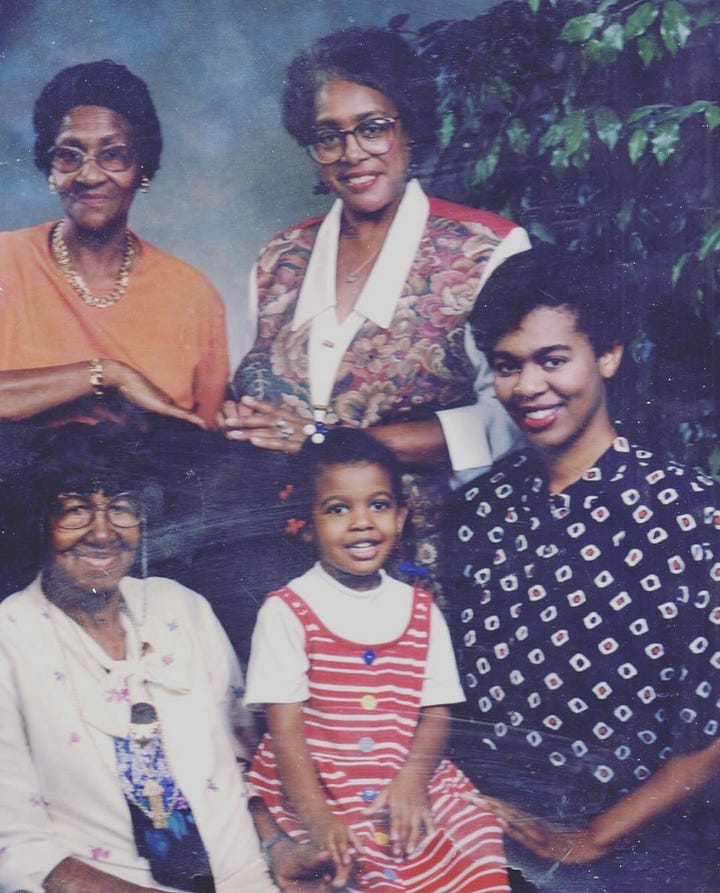
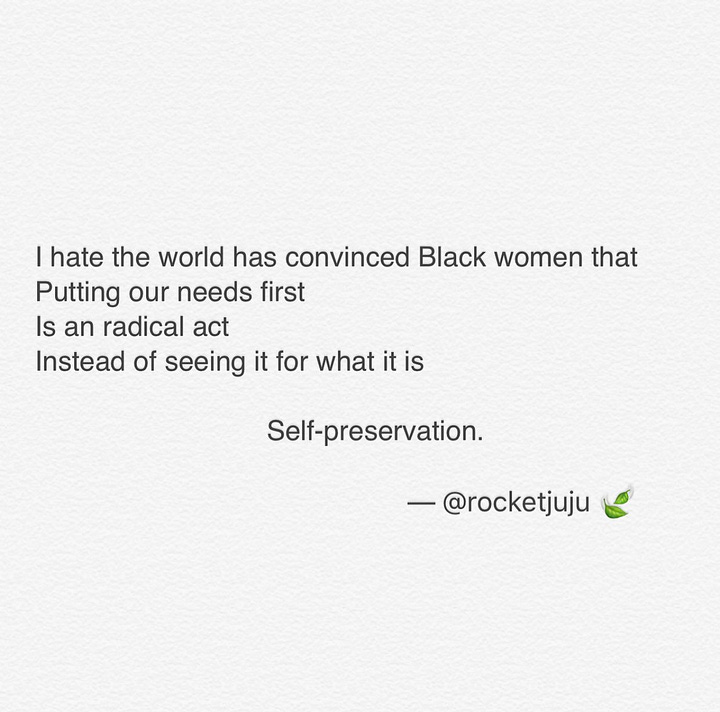
Julia Craven: Let’s get started with you telling me about yourself and your work.
Dr. LaNail R. Plummer: I have been a therapist for almost 20 years. I came into the field because I wanted to make sure that I could support the healing process for people within my identified communities. So Black folks, women, and people in the LGBTQ community. There are different identities within those groups as well, like mothers and spouses. But I really wanted Black clients to see somebody who looked like them and who could also relate to them. The relating piece may be a reflection of not only their identity as a Black person but also various socioeconomic statuses, education levels, living across the country, and things like that. That's how I ended up creating Onyx, which is predominantly Black, so that we could have multiple people representing multiple identities, but with a therapeutic and educational background.
I'm a mother, and I have two children. They’ll be 18 and 21 this year. So when we talk about generational trauma and generational cycles, it was also important to me to be as equipped as I possibly could, knowing that I was purposed spiritually to break generational cycles in my family—specifically around mother-daughter relationships, poverty, education level, and marriage. I knew at an early age what my purpose was. And I believe that God gave me my purpose early, and I think that it happened that way because my God and ancestors knew what I was going to be experiencing in life, and that I was going to need something to anchor me and ground me so that I didn't lose myself. I was also able to use different foci to raise my children, whom I'm extremely proud of. Still, there have definitely been moments in our relationships where I could see how difficult it was to break those cycles.
With my therapist, we came up with an analogy that breaking generational cycles for me is like being a dam, and so there's lots of water and pressure that's constantly on my back. But in front of me, I see pure, slow-streamed water that's doing really well. That's how I think about breaking generational cycles. The person breaking the cycle has a lot of pressure on them, and they have to continue to look forward. But they still feel the pressure of the past, of trying to protect the next generation from feeling some of that same pressure or the toxicity in the water behind them.
That's how I see myself, especially in the context of the conversation that we're having here today.
We're going to have a great conversation. Thank you so much for sharing that with me.
You're welcome.
How has generational trauma shown up historically for us?
It shows up in lots of different ways. There's generational trauma, and then there's generational experiences. And depending on who's narrating the story, those will show up differently. Not to say that generational trauma doesn't exist, because it absolutely does, but sometimes the things that we pass forward are not necessarily connected to trauma. It's learned behaviors that could end up becoming traumatic.
So, if we take, for example, spankings and beatings, many of our ancestors preferred to spank their children as a matter of discipline because they felt that it was better for them to spank their children than, say, the slave master or the police beat their children. The intent was to be protective of their children and also wanting to give discipline so that they stay alive.
The intention isn't to pass down trauma, but it does. We now recognize what physical abuse does to the brain. We also recognize what physical abuse from a primary caretaker does to attachment and a person's ability to attach to other caretakers or other people that they appreciate and love in their lives.
That's one example. But even the ways that we spend money may or may not be connected to trauma, the ways that we raise our kids or the ways that we take care of our house—and that connects to religion in terms of cleanliness being next to godliness. For some people, that can trigger OCD behaviors.
There are lots of different experiences that are culturally connected. Again, some may be traumatic, but some may be part of the life journey or the family experience, but it still needs to be corrected because it doesn't fit anymore. I use analogies with my clients, like your grandmother taught you how to ride a bike because all she knew was how to ride a bike. It's not that she was bad because she didn't teach you how to drive a car. She didn't know how to drive a car, so she taught you what she could. But if you get into a car and try to use the same process of riding a bike, you'll get in a car accident. You can't blame your grandma because you got in a car accident. She taught you what she knew, and it applies in certain situations, but sometimes it doesn't apply anymore. It's our job to use discernment and wisdom to tell the difference. I take that into consideration when I think about generational experiences and generational trauma as well.
I have many conversations with my friends about this, and we’re all aligned on the fact that if we have children, we will not beat those kids. Personally, I don’t blame my great-grandmother for whooping me because that’s what she knew, and I knew that she was trying to protect me. But how do we balance meeting our elders and ancestors where they are with questioning these pathologies that have been passed down?
If we still have access to our grandparents, I think it's a matter of questioning them in an objective manner as opposed to questioning them with judgment or confusion. Sometimes we're trying to figure ourselves out, and so we go to our elders and ask why questions—and why questions tend to be laden with judgment. Why did you do this? As opposed to how did you learn that this was the best approach? It's a matter of grounding ourselves and being curious about what we want as the outcome of these conversations. Do we want our elders to feel bad for what they did to us? Or are we trying to gather enough information to know how to correct it in the future?
Many people who have been parents will have some guilt around some of their decisions because they're not perfect. So if the aim is to make a person feel guilty, they've already experienced that, whether they tell the child that or not. When you go into that conversation, be curious about who these folks are, how they’ve learned to be who they are, and what they want from us. Whether they executed that perfectly or not, they had an intention.
So, when the grandmother pulled out a belt, what was her intention at that time? Was there fear? Was there confusion? Was it anger that was there? That also will shape how we see ourselves in those situations.
As I've been thinking about this conversation, I keep coming back to these cultural beliefs around strength and resilience in our communities and what it means to be “strong,” particularly for Black women. I would just love to get your thoughts on that, particularly when it comes to breaking through that belief to start your healing process.
I have lots of thoughts on that one. (Laughs)
We all do, right? (Laughs)
We've gotten into this place of toxic strength. A lot of Black women have been socialized to think about strength as, We must always be strong. We must always carry more weight than we can. For some of us, we internalize that as an identity. “I’m so strong, I can handle all this.” Sometimes that means we put ourselves in positions or stay in positions that require strength and never allow us to rest. That may be in the relationships we choose, the jobs we choose to work in, or the people we decide to hang around. This idea of strength is not used in the way strength is supposed to be because it's not supposed to be an identity.
For example, I lift weights. My dad was a bodybuilder, but I lift more so for functionality. I'm over 40, and I'm trying to prevent osteoporosis. But when lifting weights, we lift the weights based on what we can currently handle, and we gradually increase that weight over time. When our muscles get tired, we put the weight down and take a break for a day or two. We also have to stretch to keep that muscle strong so that we are not hurting ourselves when we need to lift the weight or when we desire to lift the weight. So one might say, I'm a bodybuilder, I lift weights, but they don't necessarily identify as that strength. If Black women could change the narrative they use in that situation, I think it would be more helpful when faced with adversity.
I think about it in that way. We don't always have to be strong. We don't always have to be lifting weights or challenging our strength. Sometimes we need to choose rest, and a lot of Black women don't rest because they've been socialized not to. And once they know better, they still don't necessarily do better. Rest is a skill. It's not necessarily something that we just do in our community. We don't always understand how to take care of ourselves. A lot of it is toxic socialization, passed down from one generation to the next.
I’m Generation X and work a lot with Millennials. We are in a different situation where we know better and still are not choosing to do better. We make a lot of excuses for why we don't do better. When I offer my patients counter statements of how we can do better, it's faced with a lot of resistance and obstacles. So I'll tell people, take time to put on your lotion and your oils and your shea butter instead of just rushing through the process. That may mean you need to wake up five minutes earlier so that when you sit down to put on your lotion, you're not rushing. But people will tell me why they can't wake up five minutes earlier, why they need to rush, why all these things need to happen as opposed to actually doing better.
That's just part of the process of change, though.
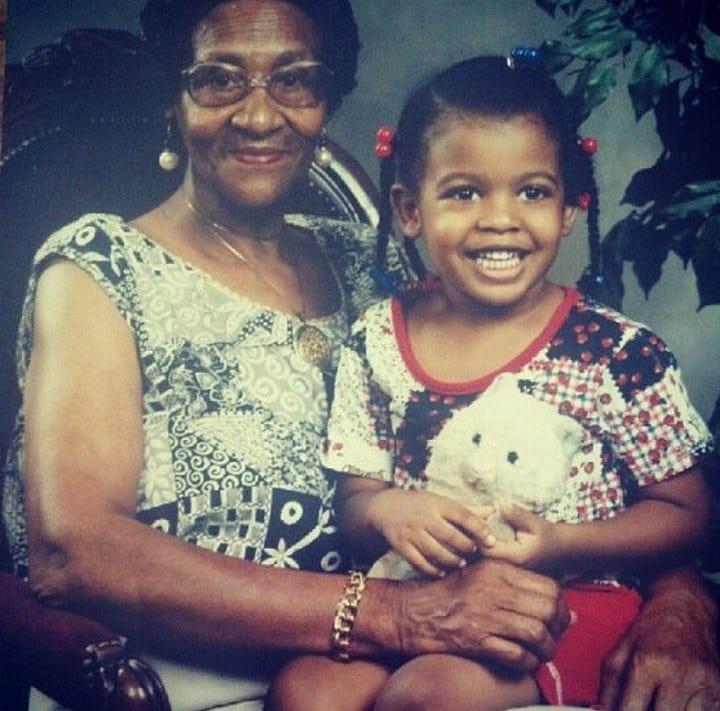
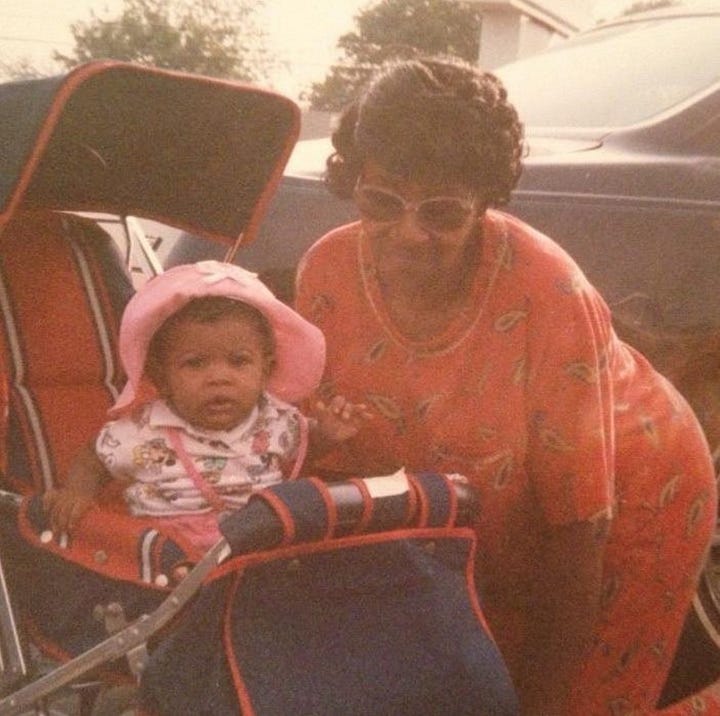
This really resonated. When you said you know better, but you're not doing better, I felt that because my great-grandma would say that to me all the time. Then I would watch her know better, but not necessarily do better (laughs). I would watch her know that she needed to rest. I would watch her know that she should let me or one of my uncles mow the yard, but she would get out there and do it anyway because she wanted to. She was lovingly stubborn. So it seems like we can also learn not to prioritize care from our elders, and that’s another thing we have to break out of.
In all fairness, our elders didn't necessarily have the same opportunities to prioritize rest and self-care. The enslaved ancestor didn't necessarily have the opportunity to sit because she was working 18 hours, 20 hours a day. So what she taught her children is to just work. Then the next generation said to just work, and the next generation said to just work.
For my generation, Saturday mornings were not a morning of rest. That was the morning you got up and you cleaned your house, and nobody slept in because that seemed like laziness. Those are old narratives from generations ago, that sitting down means that you’re lazy, and there are consequences that come with that. That's how it was taught to us.
Now, when you see someone sitting down, depending on who’s around them, they have to decide if they’re going to fight a particular narrative, if they’re going to educate in that moment, or if they're going to just avoid all of it and get up and start working again. You know what I mean?
My wife teases me because people will say, “What's one of the things you learned from being with LaNail?” And I'm a therapist, right? There are many things that she could potentially say, but one of the things that she says is that she learns how to take care of herself because I take care of myself so well, and it's revolutionary to some degree.
I will do all the things to make sure that my cup is full before I enter work, before I start engaging with my children, and before I start engaging with my wife. I have to take care of myself because, at any moment, I may be required to be strong, and I can't be strong if I'm feeling weak in other areas. I have to take care of myself because I'm breaking generational cycles, and my children are watching me.
So if I'm tasked to break generational cycles, understand the toxicity of strength, and understand where there were certain things that our people taught us because it worked for them. It was a matter of their survival, but they have positioned me now to be in a different world with different opportunities and different experiences, and living their wildest dreams. That also means I have to live their wildest dreams of resting because they wanted to rest, but couldn't. It'll be disrespectful to the gift that they gave me if I don't rest. It's a gift. We have to take care of it. We have to polish it, we have to make sure it's shining. We have to have gratitude in those moments as opposed to not.
I’m really bad about feeling terrible when I need to rest. How do you advise people to work through the guilt that can set in whenever they choose to rest or whenever they do the necessary work of filling their cups first?
When people feel guilty, my counter is, “What is the purpose of that? What do you want the outcome of your guilt to be?” People typically can't say anything about it. In those moments, I keep asking, “Why do you have it? Why do you keep it close by? Can you replace it with something else?” Of course, we can. That's how we manage our emotions. That's how we control our thoughts. So if a Black woman is sitting down and she starts to feel guilty, what is the replacement emotion that should be there? What's the replacement thought?
Everything holds a space in our lives. If we remove something, like guilt, then we have to put something in that place. I say to my clients, if you're feeling guilty for sitting down, what would it look like to say I deserve this moment? Do you really believe you deserve that moment? If you don't believe you deserve that moment, what would need to happen for you to think you deserve that moment?
It's a series of questions that we end up asking ourselves because that’s what happens with guilt anyway: We start to ruminate. So replace those thoughts with what we call the pressure technique. Just keep asking yourself, “And then what?” until we get to a point where we realize that we were being ridiculous. We’ve heard these thoughts so much that they become a core belief. Remove that belief and replace it with something else.
When I take care of myself, I think about how God gave me this body and wants me to use it. I can't keep using it if I'm stressed. I can't use it if I'm not resting. I can't be preventative about some health issues if I know better, but I'm not doing better. A lot of self-talk, a lot of encouragement, a lot of love, a lot of care.
Take the same things we say and do to people we love and do it to ourselves, too. Like with your grandmom, when you wanted her to rest and she wouldn't, you turn some of that love inward, too, and you say to yourself, “Julia, you need to rest.” And then you rest. The same way you love your grandma, you love yourself and say the same things you would say to her.
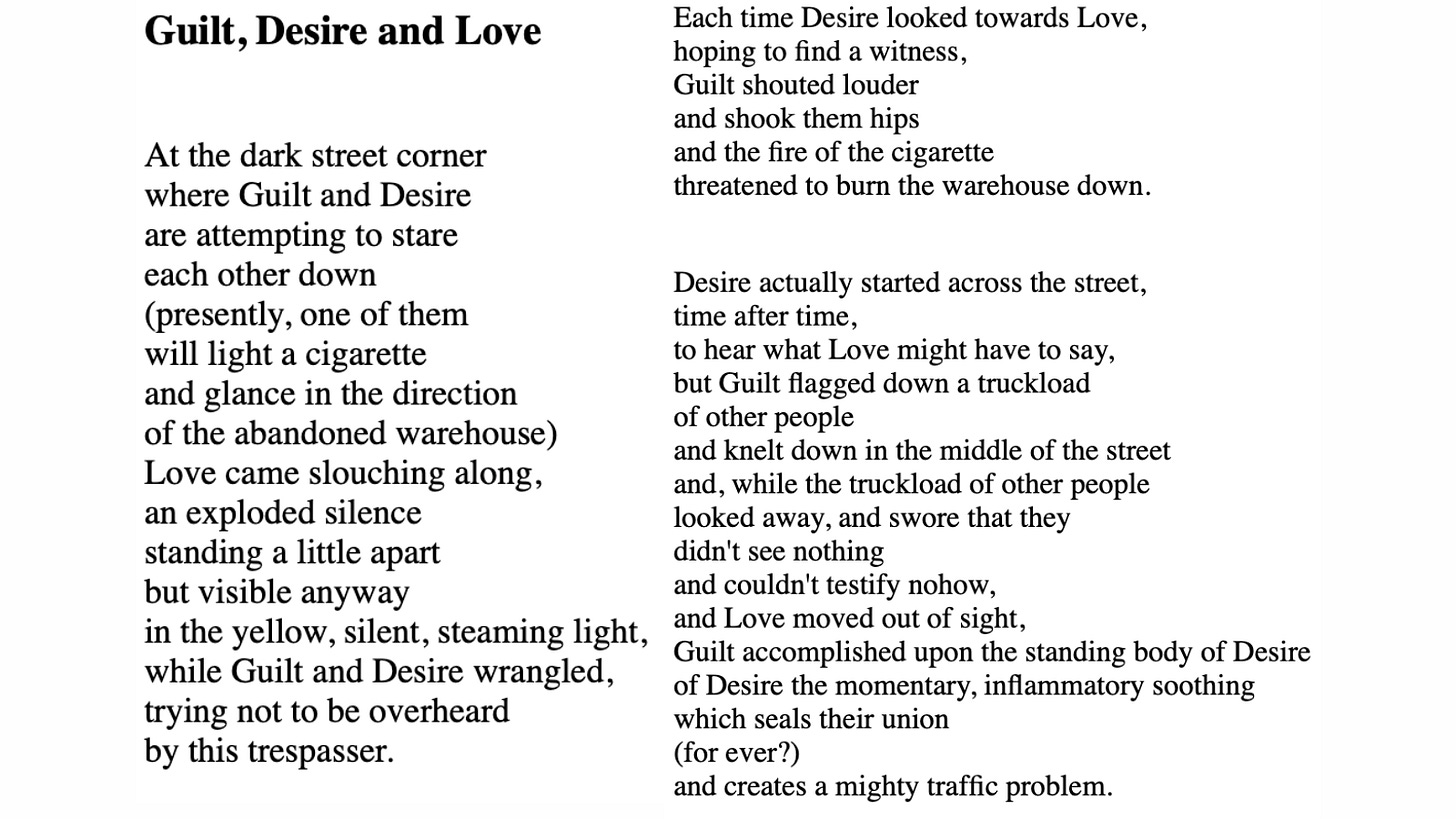
That’s so powerful and an incredible way to course-correct when the rumination goes off the rails. What is the long-term benefit here for Black folks if we continue to work to heal?
The long-term benefit is that we are healed. We are great. You know what I'm saying? We out here thriving. The long-term benefit is healthy generations. It's healthy children, it's us being free of preventable disorders. It's joy and it's love and it's community, and it's seeing ourselves when we see other people, it's looking in the mirror. When we look at people who look like us, it's a protective barrier around some of the BS that we are constantly experiencing.
It's a spiritual grounding that lets us know why we’re here on this earth and what we’re supposed to be doing. It’s living those wildest dreams of our ancestors and doing things that they only imagined they could do—and some of the things that we do right now are even outside of the imagination of our elders and ancestors.
It's the continuation of Black civilization. It is the production of what comes out of creativity. It's the beauty of art. It's the conversations. It's the books and the articles that we write. It's the extension of what we are on this earth to do. It's beautiful. It's internally and externally appealing. It's aesthetic. Yeah, that made me emotional.
Take the time you need.
I'm ready.
You sure? I got a lot of time. I can wait if you need it.
No, I’m good.
This is a big conversation that we're having, but now I'm fully putting the ball back in your court. Is there anything important to this conversation that I haven't asked about?
I'm not quite sure what angle you're going to take with the article or the post, but I keep hearing that many Black folks are wondering how we will get through this political moment. A lot of people are scared, confused, and triggered in some of our generational traumas. We recognize that in different presidential administrations, we become the direct target. When we look at the Reagan administration and the war on drugs, that was not some universal war on drugs. They were targeting some of our parents, aunts, and uncles, who are still doing time for things that are legal right now. They were selling marijuana, and everybody sells marijuana now.
But our ancestors and elders taught us how to get through these moments because they went through worse moments than we are currently. We have to go back to our history and read our literature—old books by Jamaica Kincaid and books older than those by James Baldwin or Ralph Ellison—because knowledge is there, just as we had escape routes in our hairstyles.
We have the opportunity to sustain ourselves in these moments by reading into what the old literature says, what the old art did, and what the old conversations were. It's important in these moments that people can find peace by going back and reading and seeing and understanding because they taught us how to get here, and they will teach us how to maintain this space. Sometimes, we get to certain ages and think we know more or better than our elders. They don't know how to use a smartphone, so we think that they don't have anything to offer us. But it's important to have those conversations similar to the way that this conversation with you and I started—going back to our grandmoms and asking them questions. How did they make it through these things?1
We also have to ask ourselves what does it mean to be in community? We don't always value community the same way now. People cut their friends off immediately and talk about how it's because of a boundary, or people stop talking to their parents because there was hurt that was there, and the parents were too egotistical to apologize, and the children were too sensitive to understand. We have lost a sense of community, and community is part of our survival. It's a protective factor for us. We have to reimagine what community looks like, and we have to engage a bit more.
Absolutely. I am on TikTok more than I should be, and me knowing better and not doing better for real is how much time I spend on that phone. But I see so many posts in the vein of what you're talking about here. “I cut this person off because of this,” and “I cut this person off because of that.” It’s not always for a silly reason that could’ve been hashed out and resolved relatively easily, but too often it is in the name of “boundaries.”
They're so proud about it.
Soooo proud! My takeaway is that people want to be in community, but they don’t want to be communal. So many people seem like they don't want to develop conflict resolution skills. But this is what we do when we're in community with each other—sometimes we fight, we get into it.
That's right, and conflict isn't always bad. It can be an opportunity to learn. And folks are using terms in ways that they're not supposed to be used. A boundary is supposed to be like a fence, and you decide when you open up that fence and when you don’t. It's not a wall. It's not supposed to be impenetrable, but only in mental health do we have people with lived experience now claiming themselves to be experts in the field. If I had cancer, I don't get to turn around, heal from cancer, and call myself an oncologist. You know what I'm saying?
You’re the expert on your experience, but you’re not the expert on what depression is, for example. Equally so, people are not the experts on things like boundaries. Using mental health terms inappropriately is causing a negative ripple effect. I'm excited about how much people lean into mental health. I'm excited about how many conversations I get to have about mental health. I'm excited about how many clients come to us because they want to pay attention to their mental health. But I'm concerned with how we are misusing this information. Having two or three bad days doesn't mean that one is depressed. Having anxious feelings doesn't mean that someone has anxiety. Having a conflict doesn't mean that somebody has to get cut off.
That's why I talk to different journalists like yourself. I want to help normalize the conversation while also keeping it within healthy bounds. There are parts of it that are getting kind of out of control, and it's going to cause us more harm than good.
This is where the storytelling part of health and wellness can skew, right? I think about Audre Lorde and her essays in A Burst of Light and her quote on self-care—the actual thrust of it, not how it is bastardized in the mass media. I think about how our elders were telling the stories of how they take care of themselves and how it is an act of preservation. It's an act to ensure that I am still here and I can be here for as long as I can be here in a healthy way because death is inevitable. We're all going to pass away someday. It's the only thing in life we're promised if we're going back to things our grandmothers told us.
But we have made health and wellness, mental health, every aspect of it, less about living a healthy life to be in community with people, and more about optimization and the pursuit of capital. That's terrifying, honestly, especially for Black folks since capitalism has done a number on us.
Yes, it has. It has, it has, it has. Part of it is because we were kept away from capital for so long, and now that we have more access to it, we want more of it. I think that we move in those ways around capitalism, because we're still trying to catch up, and we're trying to show that we've caught up, or there's some internal worth that's connected to how much money we make or what we have.
Now, don't get it twisted. I'm from Los Angeles, and we definitely will show out with some stuff. It is just part of the culture. I’m not without my bags and shoes and jewelry, but I also recognize the moments where I’m being toxic, I’m engaging in a poisonous kind of way around capitalism, versus when I am just merely enjoying myself in that particular moment.
We don't always use our discernment to tell the difference. Why am I pursuing this? Why am I overworking to make more money, and is it sacrificing my children? Why am I doing this? Those things are also connected to our mental health.
The pursuit of capitalism is damaging in a lot of ways, and if we don't acknowledge its role, then we’re going to pass it down to the next generation, too.
It’s for this reason that I’ve interviewed my Nana several times about politics, history, and self-care.



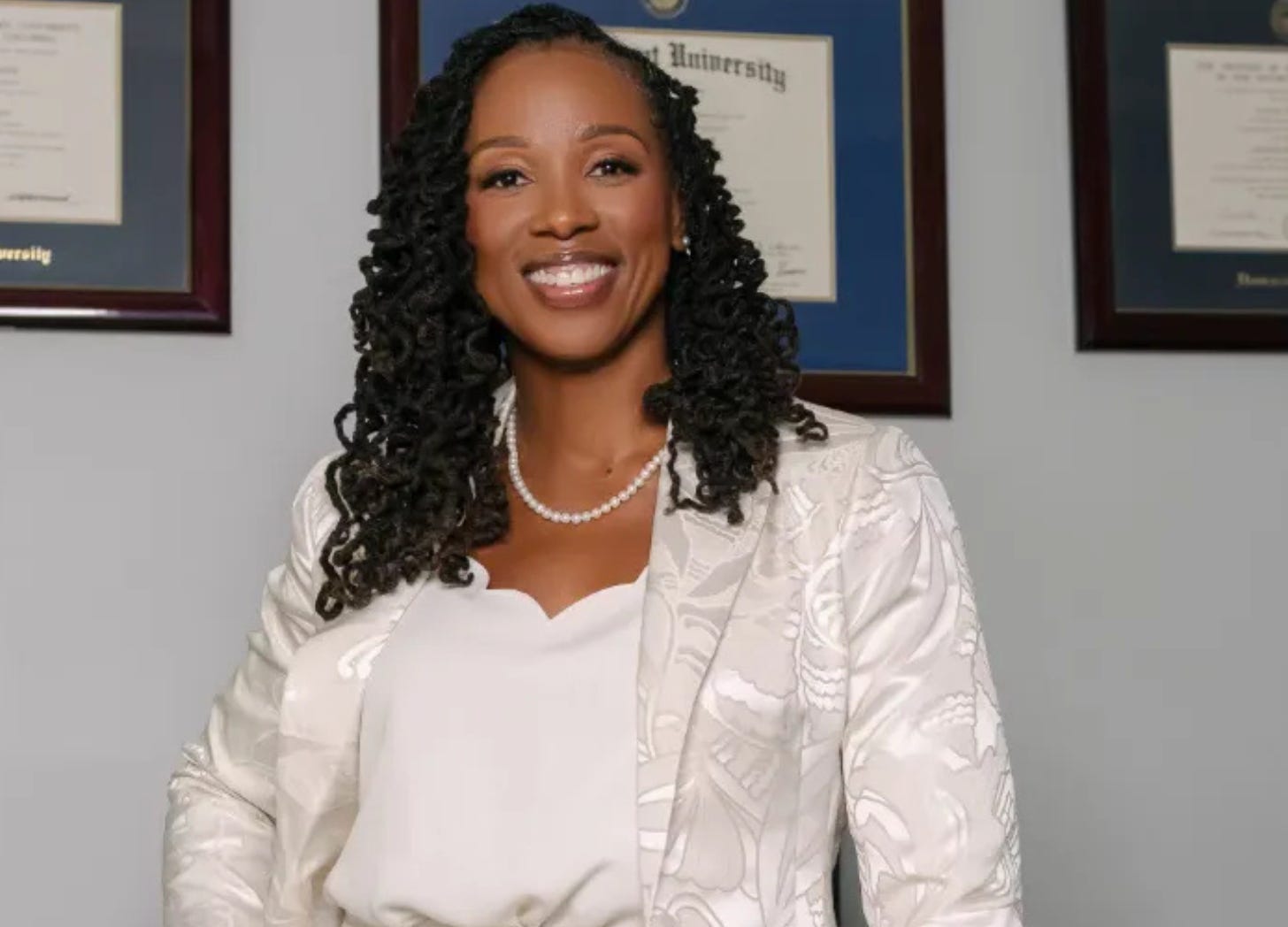
Great article. I love reading content from a fellow-therapist.